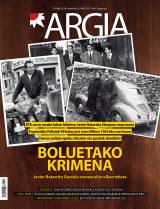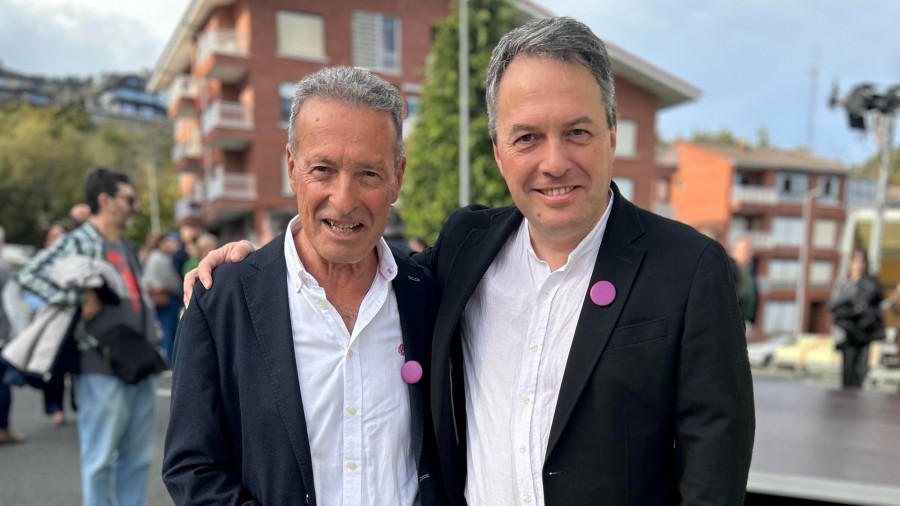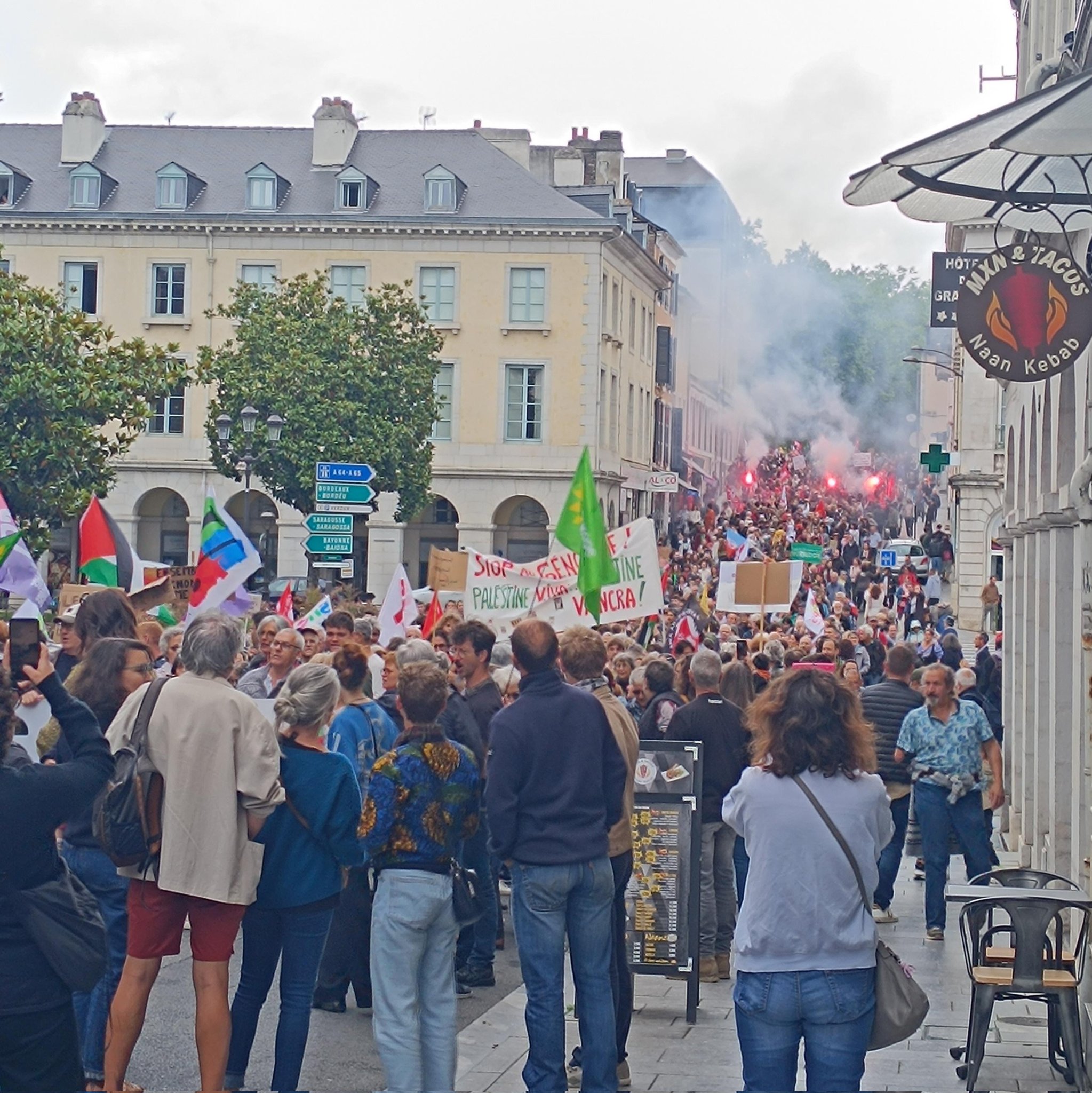"Lur Berri has developed differently, unfortunately against the Basque"
- Baigorri. Farmer son. Culture studied. Engineer. He has worked at Amikuze's Lur Berri cooperative. Journalist also in recent years. He's back, but he's working. After Jean Pitrau, La révolte des montagnards, has published Jean Errecart, La grande mutation (Elkar). An essential book to meet Amikuze and Jean Errecart, farmer, trade unionist and politician.

You made known Sulatino Jean Pitrau and then Bajonavarro Jean Errecart. What kind of welcome has the second one had?
Jean Errecarte’s book has aroused great curiosity in Amikuze, as well as in Jean Pitrau’s book, if that were not enough. However, there is a school in Donapaleu called Jean Errecart, and a lot of people, and especially young people, don't know who he was. Everyday life is going very fast, today's news covers yesterday's news. Through the information of the new media, we get a lot of things in our heads. Ah!
Somehow you've come back to youth, through these people you've made the world known from the bottom.
Yes. More or less my father was a Pitrau fan and he was also a Errecart fan. They were ten years apart, and both, in their own way, have worked for the Basque Country. I had the advantage or blackmail of having met the two. But there are also more people that are worth mentioning. For example, Bernard Massondo. Which helped win the struggles of the first tenants. In any case, thanks to the book and the pastoral ministry you now know who Pitrau is. I hope that Errecart, whose spirit has been very marginalised in Amikuze, is also known, hardly exists in the Lur cooperative Berri.Al, just as the Zabalik association did on Thursday of February during the conference sessions, at the local Liceo it is also worth making known. So far, however, they have done nothing.
We know the time of Jean Errecart: Founded in 1909 in Oragar, Amikuze.
At the beginning of the 20th century there was a serious crisis between the Church and the Republic, which in 1905 established a law that separated the State from the Church. It was in the hands of the most conservative Church, politicians were also their subjects and they were furious at the Church. The conflict was terrible. The Church, which favoured kings, opposed the Republic.
In the Basque Country, the politician Jean Ibarnegaray was a god. He and his supporters opposed the Republic. “What are we going to help Christian schools if they speak against us?” the Republicans said. That is why the Basque world has lost the republican world, the priests were favorable to the Basque and the supporters of the Republic were thrown at the priests, so the Basques did not want them.
Here, the Church dominated everything. Trade unionism, cooperatives, elected officials or municipalities were in the hands of the conservatives. The lords were the lords.
In case of discharge, II. After the World War, the Church has been the scene of progressive movements that focused on the publication of Le sillon, a peasant of whom Errecart was part. A progressive group has created the JAC (Jeunesse Agricole Catholique). The young people left school after fourteen years, they had nothing to train. Errecart did a great job. JAC became Basque Youth in the Basque Country. Also Jean Pitrau was by his side. For example, until then the trade unionism was in the hands of the caciques, they did not want to move anything. The peasants had an enormous force in the elections, and the more peasants they had in their favor, the more easily they won the elections. The lords held the house in immobilism for their own sake.
In the book he has given the keys to Amikuze’s great change, among which he says it was a kind of “secret revolution.”
These young people will realize that you can't live in the countryside. That agricultural policy must be changed, that young farmers must be allowed to expand their farms, leaving aside laws and old farmers. Some laws allowed the elderly to leave the farm ranch [income or rent] to the young. If land was on sale to give farmers the first chance to buy, farmers concentrated to sell and receive training. But this was not the case, and that is where the “secret revolution” begins, which changed agricultural policy in a normal way.
Jean Errecarte helped bring about change: he was mayor of the town, counselor of the department, deputy and senator.
“Errecart leaves the priesthood path and goes to Bordeaux, where before the war his head changes. With the fascists he had great scenes, met the anarchists and his vision changed radically.”
I have known little about Errecart. The daughters, plus, you see; Maite in particular. I healed three or four months at Lur Berri, while I was studying. Errecart had a really complicated life: on Monday he looked at Pau, at the Parlament de Navarre. On Tuesday he was going to Paris at night, where he stayed until Thursday; on Friday he was in Donapaleu, where he was President of New Earth. On Saturday official acts, on Sunday the family, the Mass and the works of the City Hall of Orgrasp, for being mayor. That day by day gives us its rank.
But before that there had been a kind of change in their ideology.
Errecart was a labrador in life. He started his political career in trade unionism, as did Jean Pitrau. However, Errecart's father was Jean Ybarnegaray's follower. It was the god, the president of the Basque Ball Federation, the great leader, the right. Errecart grew up in a family of three priests [uncle] wolves, educated in conservatism and who he had also learned in the seminary. But he leaves the path of the priesthood to go to Bordeaux, where before the war his head is changed. With the fascists, he had incredible tragedies, he met the anarchists, and his conception changed radically. So, always remaining in Christian, he turned to progressism rather than to stop at conservatism.
He was a farmer, that's also key.
And so is that. His action was more important than that of Elea. It was not, like the politicians of yesteryear, a beautiful and competent speaker, applauded by the public. Errecarte’s motto was “doing, doing and doing”. It wasn't like the traditional politician, he picked up the tractor. It is obvious that this is a farmer. He wasn't the only one. As I said, the Massondo family was there. By their side they did a hard job on the issue of the landlords, fighting for the syndicalism and for the landlords. Errecart approached the landlords through them.
The farmer in Paris as a parliamentarian.
Errecart is in Parliament, and the Left and the Communists, and also the forces in power after the war, want to give a boost to agriculture, which was not enough to eat, and France was a fast territory. Errecart said, “First we have to feed our citizens, but not only that, we need profits to sell and collect currencies to buy tools.” Therefore, one of his first ideas was to make new lands, as the lands were good in the Amikuze region. In good condition, not for free, but I saw that with the type of aid a lot could be achieved. Then new lands were formed, but not only in Amikuze. Iholdi, Bidaxune and also on the coast. Nearly 15,000 hectares of land were renovated or repaired. This was the big change, called the big mutation.
What happened to tenants?
The tenants of the property had a one-year contract with the homeowner. When maize was sown, it was said: “For the four main lines, six domestic lines.” “Bread was also half and half.” The landlords had no power to decide. So they needed the owner's authorization for everything they did. In addition to making “new lands,” I think more than that, the great change was that the landlords became owners of their lands. To be honest, among the first there was everything, even the good ones, but there were evil, a peasant walking, feudalizing the cultivation...
However, changing the laws would not be easy.
In 1946, after the eviction of the Germans in the National Resistance Council, the communists, the Gaullistes, the centrists of the MRP (Errecart Party) and the progressives analyzed many laws. One of these laws stipulated that if tenants consult their owner for the rental (until then the price set by the so-called Fermage Law for the age of nine), the owner or owner of the house would choose him for the rental. That is, it is rented by the family member or taken over by the owner. In the Basque Country, however, the neighbours were agitated. The letter on the last page of the book says that 20 peasants have signed, that some bosses have wanted to retain the soil and that the landlords feel slaves. The law has been applied here very slowly, as people barely knew French. The change has taken place slowly, as there were hardly any disturbances against the owner. In Amikuze, the transfer from home to property has been longer than in the rest of the territory.
To know the current society of Amikuze and Donapaleu, it is essential to know the past. How was that boss constituted?
“Eñaut Etxamendi met very close to Errecart.Se rumours that he was going to take over. Etxamendi says Errecart was a born Basque”
This nobility has come from old, they were the owners of the castles. The lords of the castles of Euskal Herria, Bordeaux, Pau or Paris lived here and there. The Kingdom of Navarre, for example, had a court, Jews and powerful. There was also the small bourgeoisie of Donapaleu, a merchant. Then, the holders of resources bought the land, and many merchants did the same. So there were noble foreigners and a small local bourgeoisie. This greatly influenced Errecart’s political life, Errecart never reached the majority of the votes in Donapaleu, always had the city against. It's well explained by the landlords.
How?
The peasants and, above all, the landlords, have been despised by their subordinates. Legend of the landowners: “My daughter will never marry a farmer.” Among the citizens of Donapaleu there are still feudal attitudes, looking towards farmers. I'll give you a hypothesis to learn about Amikuze's sociology: The lords and merchants of Donapaleu were Franciscans, enemies of the Basque world. Today that spirit is there. Tenants have been dependent, but they also wanted an economic achievement, they
have shown that they served something, and they have given priority to economic development.
It is also worth remembering Jean Errecart’s vasquism.
On Thursday of February it was Eñaut Etxamendi’s turn in the talk on the occasion of our program. He recognized Errecart very closely. After Errecart's death, it was rumored that Etxamendi would take his witness. In his speech, Etxamendi said that Errecart was a born Basque. In his writings, Errecarte claimed the Basque culture, the Basque and the Basque in the elections, and it was difficult to do so in bilingual, although at that time the environment was radically opposite.
I walked around the tempest movement.
In 1960 the first Basque political movement was born: The house. In 1963 Errecart was in Itsasu, celebrating the first Aberri Eguna in Iparralde. His son-in-law was Michel Eppherre de Enbata, husband of his daughter Georgette. The spirit of the storm, at first, in favour of our identity and our language, was well seen, or not bad. The Errecart party (MPR) saw it well. But then, on the other hand, many exiles came here, who brought a new vision of how to act, by the use of violence, Errecart and those around him “we can’t follow this”, they said. They created the movement of new forces. Something that didn't last long.
“Lur Berri II. Mundu Gerra aitzin sortu zen, ordurako sindikalismoa indarrean zegoen. Ongailuen eta tresnerien behar handia zen, baina horiek denak jauntxoen esku zeuden. Jauntxoek dena menperatzen zuten politikoki: laborantza mundua, sindikalismoa barne. Gerla ondoren gauzak pixka bat aldatuko dira, belaunaldi berriak sortu direlarik jende eta buru berriak hasiko dira laborantzan.
1954an, Jean Errecart laboraria eta sindikalista buru, gazte talde bat sartu da Lur Berriko administrazio kontseiluan dena itzulipurdikatzeko. Lehenagoko jauntxo denak kanpo ezarri dituzte. Errecartek bazuen ideia oso argia laborantzaz, ‘artoa saltzeko ez dugu kooperatibaren beharrik, kooperatiba behar dugu teknika eta ekoizpen berriak guhaurrek egiteko’, erraten zuen.
Ideia berriak ekarri zituen, hala nola, hazitarako artoa eta abelazkuntza behar bezala garatu beharra. Teknikariak sartu zituen kooperatiban laborarien laguntzeko, bultzada bat emateko kooperatibari, baina, haren ideiak zoritxarrez ez dira asko garatu Lur Berrin.
Lur Berrin, boterean dauden politikarien espiritua nagusitu da gaur egun, Jean-Jacques Lasserre-ren espiritua, besteak beste. Errecartek langileei buruz ari zen eta langileentzat. Areago, haren espiritua sobera euskalduna zela zioten, eta ez zuten begi onez ikusten. Lur Berriko garapen azkarraren ondorioz, garai batean sosa bazegoen. 1980. urteetan, Euskal Herriko hainbat laborarik –piperra edota gazta ekoizteko– laguntza behar izan zuten. Lur Berriri laguntza eskatu zioten, baina ezezko biribila ukan zuten. Lur Berrik Euskal Herria bazter utzi du, beste molde batez garatu da kooperatiba, eta zoritxarrez, euskalduntasunaren aurka”.
“Bi planak ez ziren berdinak izan, Marshall plana estatubatuarrek ezarri zuten komunisten beldur. Komunismoa Europan nagusituko zela pentsatzen baitzuten. Monnet plana delakoa Ekonomia Kontseilu Nazionalaren barnean garatzen da. Bere bultzatzaileak oso progresistak ziren, orduan sortu zen geroko eredu sozial arrakastatsua. Komunistek eragin handia zuten Frantzian. Errusian planak bost urtetarako egiten ziren: ‘Horrenbeste altzairu, bihi edota ardo ekoiztuko dugu epe jakin batean’. Hau da, planifikazioaren bidez garapen ekonomikoa azkartzen zen. Frantziarrek begi onez hartu zuten ideia hura. Frantziako eredua hala ere, salbuespena izan zen. Frantses erako planifikazio bat sortu zen, akuilatzailea. Hasieran Monnet bezala ekarria, baina gero II. III. IV. eta V. plana ere izan ziren. Horrek Frantziako ekonomia erabat aldarazi zuen”.
Lehen itzulitik bigarrenera, auzapezgotzara jauzi egin zuen Ramuntxo Labat-Aramendi abertzalearen zerrendak. Erdiespena "xinaurri lanari esker" egin zela uste du Labat-Aramendik. Ahetzen zerrendak bozen %44,39 lortu zuen urtarrilaren 12an eginiko behin betiko bozketan... [+]
Departamenduko Laborantza Ganbarako hauteskundeen kanpaina abiatu da. Urtarrilaren 14an bozetara aurkezten diren hiru sindikatuen ordezkariekin bi oreneko eztabaida sakona antolatu zuten Euskal Hedabideek, osoki euskaraz.
Pantxoa Bimboire Haritxelar, Ipar Euskal Herriko Eusko Alderdi Jeltzaleko arduradun berria da azarotik. Ipar Euskal Herriko ekonomia munduko pertsona ezaguna da.
«Argizko idazkun digitalak debekatu» lelopean, Aturri aldeko Stop Pub kolektiboak bederatzi proposamen plazaratu ditu, Tokiko Publizitatearen Araudia eztabaidan delarik momentu honetan.
Bagira prozesuaren emaitza, Herri bidea bide-orria izan zen. Bide-orri honetan, abertzaleen helburua herriari boterea itzultzea dela aipatzen da, eta boterea itzultzeko, herriari burujabetza maila maximoa emanen dioten instituzioak herriari eskaintzea adierazten da. Zehazten da... [+]
Who could expect EH candidate Bai, Peio Dufau – who is replacing Marie Heguy-Urain – to be a Member by 2024? The campaign and strategy against the extreme right have worked. Ipar Euskal Herria will not send any fascist to the French National Assembly. How long will the... [+]
At the level of the French State, equally or even stronger, the people have stood up to the far-right. In Ipar Euskal Herria, a wall has been imposed on homophobic and racist discourses. "We have denied the far right to dance," said the members of the left-wing coalition Frente... [+]















.jpeg)






